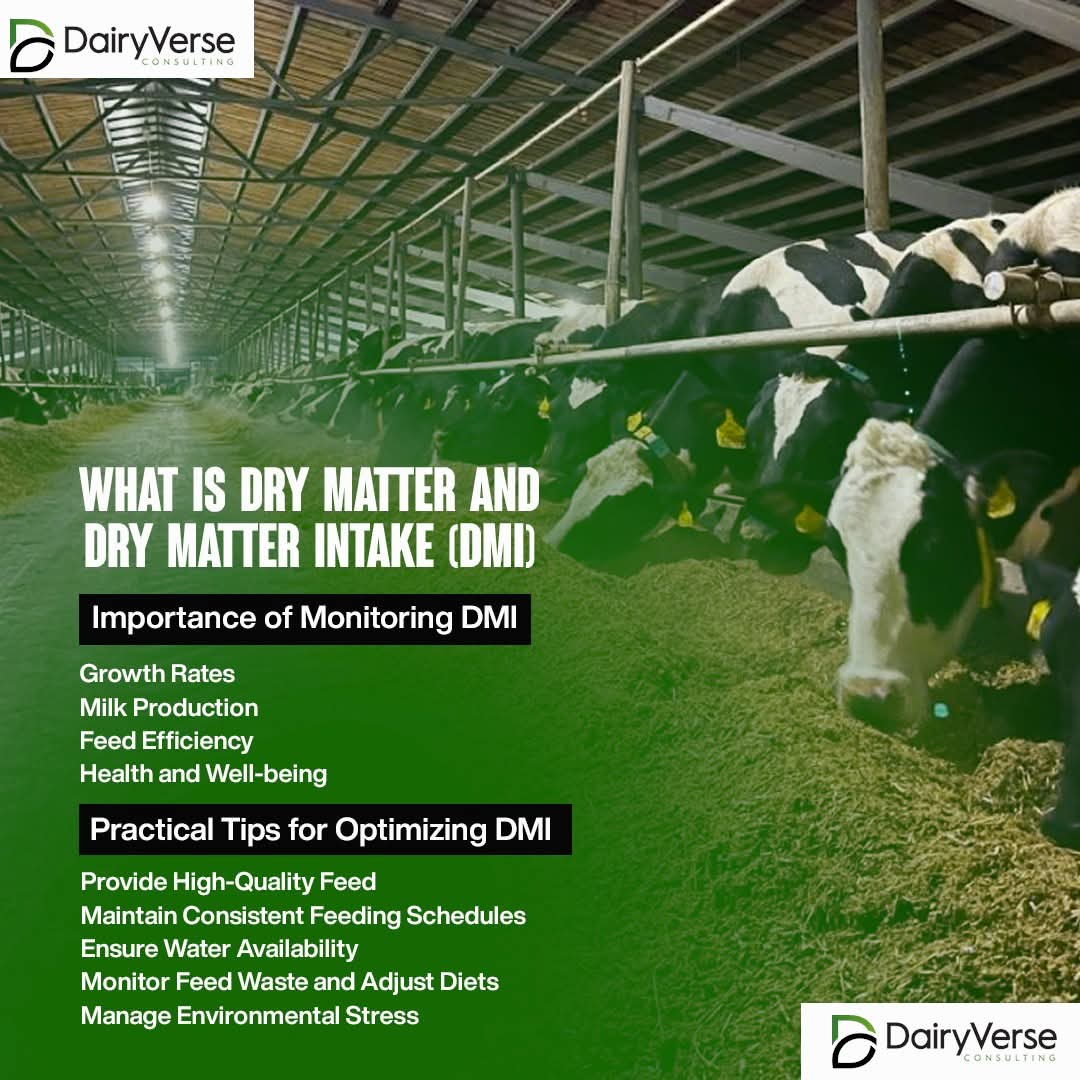Address
304 North Cardinal
St. Dorchester Center, MA 02124
Work Hours
Monday to Friday: 7AM - 7PM
Weekend: 10AM - 5PM
Address
304 North Cardinal
St. Dorchester Center, MA 02124
Work Hours
Monday to Friday: 7AM - 7PM
Weekend: 10AM - 5PM
Dry Matter (DM) refers to the portion of feed that remains after all moisture has been removed. It includes essential nutrients such as carbohydrates, proteins, fats, vitamins, and minerals.

Dry Matter (DM) refers to the portion of feed that remains after all moisture has been removed. It includes essential nutrients such as carbohydrates, proteins, fats, vitamins, and minerals. Since moisture content varies in different feedstuffs, evaluating dry matter allows for an accurate comparison of their nutritional value.
Importance of Dry Matter in Livestock Nutrition.
Understanding dry matter is crucial because:
Accurate Nutrient Assessment – Feed moisture content varies, so dry matter provides a true measure of the nutrients available to animals.
Diet Formulation – Balancing rations requires knowledge of the actual nutrient intake from dry matter rather than the total weight of the feed.
Performance Optimization – Ensuring livestock receive adequate nutrients helps maintain productivity, growth, and health.
What is Dry Matter Intake (DMI)?
Dry Matter Intake (DMI) is the amount of dry matter an animal consumes within a given period, typically measured in kilograms per day. It is a key factor in livestock feeding because it directly impacts energy and nutrient intake, affecting animal performance.
Factors Affecting DMI
Several factors influence an animal’s dry matter intake:
Animal Factors:
Body size and weight
Stage of production (growth, lactation, maintenance)
Health status
Appetite and metabolic needs
Feed Factors:
Palatability and digestibility
Nutrient composition
Processing and physical form (pellets, chopped, silage, etc.)
Moisture content
Environmental Factors:
Temperature and humidity
Availability of clean water
Stocking density and feeding management
Estimating DMI
The DMI of livestock can be estimated using the following general guideline:
Cattle (Dairy): 2.5 – 4.5% of body weight per day
Beef Cattle: 2 – 3% of body weight per day
Sheep and Goats: 3 – 4% of body weight per day
Horses: 1.5 – 3% of body weight per day
For example, a dairy cow weighing 600 kg may consume about 18 – 24 kg of dry matter per day.
Importance of Monitoring DMI
Monitoring DMI is essential because it affects:
Growth Rates: Sufficient nutrient intake ensures optimal weight gain.
Milk Production: Dairy cows require consistent DMI to sustain milk yield.
Feed Efficiency: Higher DMI can lead to better feed conversion ratios.
Health and Well-being: Poor intake can lead to nutritional deficiencies and metabolic disorders.
Practical Tips for Optimizing DMI
Provide High-Quality Feed – Ensure feed is fresh, palatable, and nutritionally balanced.
Maintain Consistent Feeding Schedules – Regular feeding times encourage stable intake.
Ensure Water Availability – Clean and fresh water is necessary for proper digestion and feed intake.
Monitor Feed Waste and Adjust Diets – Observing uneaten feed can indicate palatability issues or incorrect ration formulation.
Manage Environmental Stress – Shade, ventilation, and proper housing conditions can improve intake during extreme weather conditions.
Understanding dry matter and dry matter intake is essential for effective livestock nutrition management. By focusing on DMI, farmers and animal nutritionists can ensure optimal animal health, productivity, and economic returns. Regular monitoring and diet adjustments based on dry matter calculations help maximize feed efficiency and overall farm profitability.
For any questions related to dairy farming, feel free to reach out to our team on Call/WhatsApp:- 0743 699 774.
#Dairyfarmingtips #HealthyCalves #CalfCare #HealthyHerds #dairyinvestors #restoredairycow #ask_dairyverse_experts #colourfulandcenty #highmilkyieldseries #HappyCows #dairyverse #calves #fyp #farming #restoreplus #boosterplus #fertilityplus #ndamaplus #tranzpro